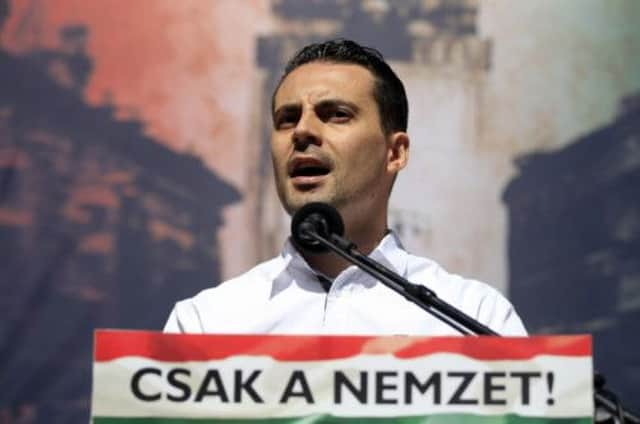For now, Hungarian anti-semitism is only statements


When my turn came I presented my credentials but my request for a quick interview was rebuffed with the line: “I don’t talk to the foreign press because they make me look like a fascist.”
These words were surprising as Vona, and Jobbik, generally do a pretty good job of that themselves. Take last weekend, for example. Jobbik supporters rallied in Budapest to protest against the city hosting the conference of the World Jewish Congress, and to demonstrate their opposition to what they regard as the takeover of Hungary by Israeli business.
Advertisement
Hide AdAdvertisement
Hide Ad“Hungary is not for sale and won’t become an Israeli colony,” was Vona’s line in a speech at the rally, although, to be fair, he also repeated his claim that he was not anti-Semitic and only had issues with Zionists, not Jews.
But this claim has a somewhat hollow ring to it given that he and his party were espousing pretty much the old European stereotype of conniving Jewish bankers that has been a staple of anti-Semites for centuries. If he was, as he claimed, only criticising Zionism and Israel and not straying into the territory of anti-Semitism, he was making a poor fist of it.
His comments and the presence of the Jobbik faithful added to the worried atmosphere inside the conference hall. Before the conference started anti-racism and Jewish groups had issued strident warnings over increasing anti-Semitism in Hungary, and there had been a string of incidents, some violent, pointing towards a rising tide of anti-Jewish behaviour.
To the dismay of Jews and many Hungarians the country’s school curriculum has also been updated and now includes authors who once flirted with or even trumpeted criticism of Jews, and Hungary’s wartime leader Miklos Horthy, a divisive historical figure who oversaw the transportation of Jews to Nazi camps but who also opposed the mass deportation of Jews, has had public squares named after him.
The Hungarian government, led by Viktor Orban, the prime minister, has come under attack for allegedly helping to cultivate the right environment for anti-Semitism by fuelling nationalistic sentiment in Hungary through battles with the EU and other international organisations, such as the International Monetary Fund.
Analysts say that Orban and his Fidesz party are perhaps aiming to steal Jobbiks’s thunder by tapping into nationalistic sentiment. But in doing so they have fanned the flames of anti-Semitism, and thus given Vona and his supporters a certain credibility and confidence.
Given the current state of affairs, delegates to the Jewish conference had looked to Orban to launch an unequivocal attack on anti-Semitism and all its manifestations during a key-note speech.
What they got left them unsatisfied. Orban said anti-Semitism was unacceptable and intolerable, but shied away from direct criticism of Jobbik, and, according to his critics, failed to draw a thick line between his government and the activities of the far right.
Advertisement
Hide AdAdvertisement
Hide AdThe failure to say “enough is enough” and to call Jobbik an anti-Semitic organisation has left some fearing that anti-Semitism in Hungary will continue to grow, and even pose a threat to the country’s democracy.
These fears, however, will probably go unfounded.
It remains unlikely that Jobbik, although the third biggest party in Hungary’s parliament, will ever get a chance to form a government, and therefore will be left to make their bellicose statements in opposition.
And despite anti-Semitism, Hungary’s Jews, far from becoming a cowed minority, are actually part of a flourishing Jewish community, which is a wonderful example of the rebirth of Judaism in Central Europe after the horrors of the Holocaust.
Some 550,000 Hungarian Jews were killed in the Holocaust and around 100,000 Jews live in the country now, the largest Jewish community in the region.
• Matthew Day reports on eastern Europe for The Scotsman.